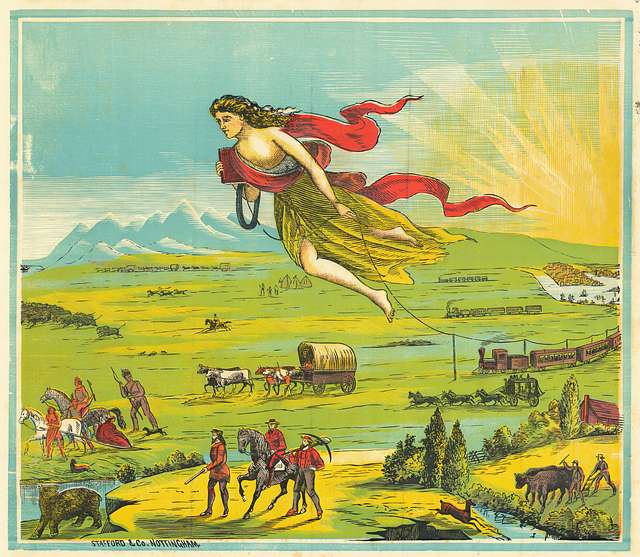We often assume that the dominant ideas of our times will just stay that way. But the history of ideas, as well as the history of science, show that this is not the case. Rather, philosophies, ideologies, worldviews, and assumptions keep changing, with one succeeding another, often in reaction against the previous status quo.
Progressivism—the view that society is continually improving, that whatever is new is better than whatever is old, and that scientific expertise will eventually solve all our problems—has prevailed in different forms throughout the 20th century. Politically, progressivism gave us Teddy Roosevelt’s optimistic reforms, FDR’s New Deal liberalism, European-style socialism, revolutionary utopianism, and today’s woke identity politics.
But the British political scientist Eric Kaufmann says that progressivism is over. He has written an op-ed for the Wall Street Journal entitled Welcome to the Post-Progressive Political Era.
This is not just a matter of Donald Trump getting elected, again. That is a symptom, Kaufmann says, of a deeper and more pervasive shift.
The liberal left spearheaded liberation from social mores around divorce, sex and the traditional family. Attitudes toward interracial marriage, women’s equality and homosexuality liberalized, making society better. Conservatives lost virtually every battle in the culture, culminating most recently in the growing acceptance of gay marriage.
The success of the cultural left created a sense of progressive inevitability. . .
The cultural left envisioned a grand narrative of progress whose next phase would move from individual rights to group rights, citizen rights to rights across borders, and gay rights to trans rights. But what Daniel Bell termed the left’s “chiliastic hopes” appear to have ended in stalemate and polarization. The attempt to push for next-level DEI policies such as segregated graduation ceremonies, mandatory diversity statements, critical race and gender ideology in schools, or males in female sports has produced an enduring antiwoke reaction. Immigration attitudes have turned restrictionist after decades of liberalization.
Today, there is a rightward shift among young people. Hardly anyone in the general public any more, liberal or conservative, is in favor of the transgenderist ideology that insists that female-identifying men should compete in women’s sports and that gender-confused children should receive sex-change treatments. Even some liberal media outlets have been criticizing mandatory DEI workshops and saying that unlimited immigration policies have gone too far.
A further source of progressive malaise is that a series of culturally inflected problems elude progressive solutions. From endemic populism to declining birthrates, youth mental health to working-class social collapse and deaths of despair, the cultural left seems to be part of the problem rather than the solution.
Kaufmann isn’t sure what will be next as the “cultural lodestar,” but he believes that progressivism as we have known it for the last 60 years is fading fast.
I would argue that progressivism has been over for quite some time, ever since political liberals abandoned New Deal optimism in favor of becoming “woke” to identity politics. “Woke progressivism” is a contradiction in terms. According to critical theory—whether of the racial, the feminist, the LGBTQ, or other varieties of “post-Marxism”—society consists wholly of systems of power and oppression. There is no way forward, except for marginalized groups to seize power and to oppress those who had once marginalized them.
Marxism at least had a utopian goal, the “withering away of the state” and the inevitable emergence of a workers’ paradise, but there is nothing like that in post-Marxism. To be woke is to be cynical, not optimistic; nihilistic, not progressive.
To believe in “progress” is to trust that things are getting better. That is, to be optimistic, hopeful, and positive about the future. Our imaginings of the future, as seen in our films and literature, have been dystopias, not utopias. What awaits us is environmental, nuclear, biological, or political apocalypse.
I think so-called “woke progressivism” is itself the evidence that progressivism is over. Not even progressives believe in progressivism anymore. Rather, they have switched into a different kind of activism, one focused on individual liberation—whether from society, the body, or guilt—with little reference to the common good.
But people now—including minorities tired of being patronized, condescended to, and defined as perpetual victims—are also rejecting this woke regressivism!
This would seem to herald a major comeback for conservatism. And yet conservatism now comes in many different flavors, with the old constitutional, small-government, free-market conservativism being widely discredited on the right. Perhaps we are not only in a “post-progressive era,” but are also in a “post-conservative era.” But that’s a topic for another day.
Illustration: American Progress by John Gast (1872) [poster for Chase & Bachelder’s American Museum of Art] via PICRYL, public domain













